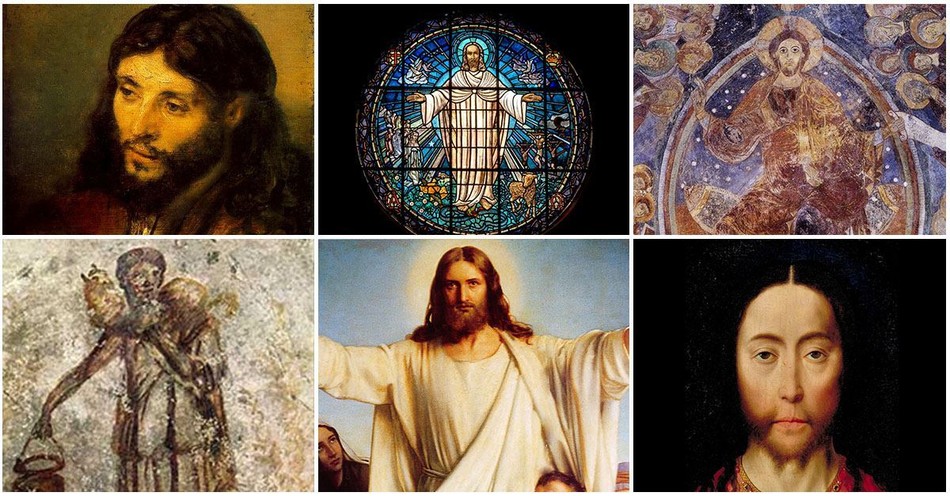After reading the Bible or hearing someone talk about Jesus, many people have wondered, “What did Jesus look like?” Since Jesus lived over 2,000 years ago, we don’t have photos or even drawings of how he looked. We can, however, extrapolate some generalities about Jesus’ appearance based on his culture and archeological findings.
Joan Taylor, professor of Christian Origins and Second Temple Judaism at King's College London, researched the appearance of Jesus for her book What Did Jesus Look Like? She believes that Jesus looked like most other people in the Middle East during the First Century.
Ancient Jewish people were similar in appearance to Egyptians during that time. Based on archeological evidence, most first-century Jewish men were about 5’ 5” tall and had brown eyes. Other scholars believe Jesus was 5’ 1” tall, and he weighed 110 pounds.
Jesus Likely Had Black Hair and a Beard
Jesus told his followers, “And do not swear by your head, for you cannot make even one hair white or black” (Matthew 5:36).
Jesus probably had a beard and short curly hair with long sideburns or “payot.” Jesus followed the law in Leviticus 19:27, which said, “You shall not round off the hair on your temples or mar the edges of your beard.” Even today, Orthodox Jewish men grow long hair on the sides of their heads.
Shorter hair was considered the norm for Jewish men and for Romans. Paul explains to early Christians in Corinth, “Does not the very nature of things teach you that if a man has long hair, it is a disgrace to him, but that if a woman has long hair, it is her glory? For long hair is given to her as a covering” (1 Corinthians 11:14-15).
Jesus Was neither Tall Nor Remarkably Good Looking
If Jesus’ appearance was remarkable in any way, the writers of the gospels would have commented on it. For instance, the Gospel of Luke describes a tax collector named Zacchaeus as short.
“Jesus was heading his way, and Zacchaeus wanted to see what he was like. But Zacchaeus was a short man and could not see over the crowd. So he ran ahead and climbed up into a sycamore tree.” (Luke 19:3-4, CEV)
If Jesus was taller than the average people in the crowd, Zacchaeus would have been able to see him above everyone else.
In the Old Testament, the future King Saul is described as good-looking and tall. “Kish had a son named Saul, who was better looking and more than a head taller than anyone else in all Israel.” (1 Samuel 9:2, CEV).
In 1 Samuel 17:4, Goliath was described as a giant who was six cubits and a span tall, which translates into over nine feet tall.
Jesus Was Not Beautiful and Wasn’t Considered Majestic
As the disciples were writing their personal account of Jesus’s life and ministry, they quoted prophetic verses from Isaiah 53. Many Christians believe that this chapter of Isaiah describes Jesus as the Messiah and the suffering He would endure.
“For he grew up before him like a young plant, and like a root out of dry ground; he had no form or majesty that we should look at him, and no beauty that we should desire him. He was despised and rejected by men, a man of sorrows and acquainted with grief; and as one from whom men hide their faces he was despised, and we esteemed him not… But he was pierced for our transgressions; he was crushed for our iniquities; upon him was the chastisement that brought us peace, and with his wounds we are healed.” (Isaiah 53: 2-3, 5)
The Matthew Henry Concise Commentary on Isaiah 53:1-3 connects this prophetic passage to Christ’s lack of beauty and appearance to his suffering and ministry.
“Nowhere in all the Old Testament is it so plainly and fully prophesied, that Christ ought to suffer, and then to enter into his glory, as in this chapter…The low condition he submitted to, and his appearance in the world, were not agreeable to the ideas the Jews had formed of the Messiah…He had nothing of the glory which one might have thought to meet with him.”
Jesus quoted Isaiah 53 about himself. He explained that “it is written of the Son of Man that he should suffer many things and be treated with contempt,” (Mark 9:12)
Matthew 8:17 explains that Jesus healed those who were demon-possessed and all who were sick because “This was to fulfill what was spoken by the prophet Isaiah: ‘He took our illnesses and bore our diseases.’”
Peter wrote, “He Himself bore our sins in His body on the tree so that we might die to sin and live to righteousness. By His stripes you are healed" (1 Peter 2:24).
Why Aren’t There Pictures of Jesus from His Lifetime?
Jesus changed the world through his ministry and message. People were martyred and died because they believed in him, but we have no physical record of what Jesus looked like. Carvings, statues, and mosaics of military leaders like Caesar and average people from the First Century have been found. Why didn’t early Christians create pictures or statues in Christ’s honor?
Since Jesus and the first disciples were Jewish, they followed the Law and used the rules in the Old Testament to guide every part of their lives. When God gave the Ten Commandments, He commanded his people to not make graven images. God’s people were to have no other gods.
After bringing the people of Israel out of captivity from Egypt, God did not want his people to fall back into the habit of worshiping idols of men such as Pharaoh or of animals.
“You shall not make for yourself a carved image, or any likeness of anything that is in heaven above, or that is in the earth beneath, or that is in the water under the earth” (Exodus 20:4).
Following this verse, God warned his people not to worship the idols or bow down to them, for the Lord was a “jealous God, visiting the iniquity of the fathers on the children to the third and the fourth generation of those who hate me” (Exodus 20:5). This was a serious command with significant consequences.
As the Israelites were about to enter the Promised Land, God further clarified the command that they should not make an idol or image in the form of a man.
“So that you do not become corrupt and make for yourselves an idol, an image of any shape, whether formed like a man or a woman, or like any animal on earth or any bird that flies in the air, or like any creature that moves along the ground or any fish in the waters below” (Deuteronomy 4:15-18).
Recommended
Why Do We Have Pictures of Jesus If Early Christians Didn’t Create Images?
You may have grown up with stained glass images of Christ, icons or statues in the sanctuary, or pictures of Jesus in your Children’s Bible. These are evidence of the artist’s imagination.
One of the oldest pictures of Jesus dates from 235 years after the resurrection. This picture of Jesus healing the paralytic was found in Syria on a wall in the Dura-Europos church, one of the oldest Christian churches in the world. Another ancient picture of Jesus, as a beardless young man as a shepherd, was found in the Roman Catacombs. By 400 C.E., artists were depicting Jesus with a beard.
Art was used in the early church to teach believers the Bible. Paintings and sculpture provided a way to help illiterate believers of all ages remember stories about Jesus. Art was a part of the Roman culture and was incorporated in early Christianity. The prevalence of art and sculpture in the Roman, Greek, and Syrian culture influenced the role of artistic representation in the church.
Ancient artwork, paintings, and even modern images represent an artist’s imagination and the prevalent culture. A quick search of Rembrandt’s paintings of Christ from the 17th century CE reveals very different perspective on Christ's appearance than earlier medieval illuminated manuscripts from the 10th century. It is easy to see how the artist’s perspective and culture influenced the clothing, hair color, and even the hairstyle that Jesus wore.
What Does All This Mean for Us Today?
When we realize that there aren’t any pictures or statues of Jesus that were made during his lifetime, it reminds us that God looks on the heart and not on outward appearance. When the prophet Samuel was directed by God to choose the king of Israel, God gave him very specific instructions to ignore Saul, who looked more like a king but did not have a heart for God.
“But the Lord said to Samuel, ‘Do not look on his appearance or on the height of his stature, because I have rejected him. For the Lord sees not as man sees: man looks on the outward appearance, but the Lord looks on the heart.’” (1 Samuel 16:7)
It is important that we learn from this to not judge ourselves or others by outward appearance. As Jesus told his followers, “Do not judge by appearances, but judge with right judgment” (John 7:24).
Matthew, Mark, Peter, and John were disciples of Jesus who traveled with Jesus during his time of ministry, and each of them wrote books about Jesus. It is remarkable that none of the books written by Jesus’ followers contain any description of his appearance. The New Testament authors made sure we focused on Jesus’ message and his heart.
When we feel average or less then when people despise us or ridicule us because of the way we look, we need to remember that Jesus was average; he wasn’t considered good-looking or beautiful, and people ridiculed him and even spat on him (Matthew 26:67).
People often judge based on outward appearance. This is not what Christians should do. Our worth is not based on how we look or how popular or attractive we are. Our worth is based on God’s love for us because he made every human in His image (James 3:9).
Sources:
BibleStudyTools.com, Baker’s Evangelical Dictionary. Idol, Idolatry.
BibleStudyTools.com, Matthew Henry Commentary on the Whole Bible (Concise). Isaiah 53.
BiblicalArchaeology.org, “What Did Jesus Really Look Like?”
CNN.com, “From Science and Computers, a New Face of Jesus.” Jeordan Legon, 2002.
LiveScience.com, “What Did Jesus Really Look Like? New Study Redraws Holy Image.” Owen Jarus.
Oldest.org, “7 Oldest Paintings of Jesus in the World.”
TimesOfIsrael.com, “In a forensic pilgrimage, a scholar asks, ‘What did Jesus look like?’” Rich Tenorio, 2018.
Penny Noyes, M.Ed. is the author of Embracing Change - Learning to Trust God from the Women of the Bible and two books about Hezekiah. You can follow Penny on her blog and on Instagram @pennynoyes.
Photo Credit (In Order from Top to Bottom, Left to Right): Wikimedia Commons/Rembrandt [Public Domain]; Unsplash/Paul Zoetem Eijer; Wikimedia Commons/ Chateau des Moines, Unknown, Carl Bloch, Dieric Bouts [All Public Domain]
Design Credit: Bethany Pyle









